Take a Serious Look at this Humble HEALTH-POWERHOUSE!
For those of us who grew up digging dandelions out of the lawn, we probably never thought, “Can I eat these?” But it’s a good question to ask.
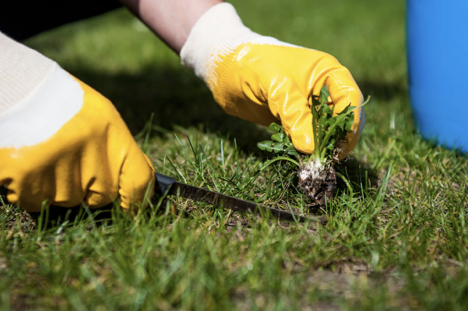
And the answer is a resounding “YES!” We know them as weeds, and no one really considers them garden vegetables. Yet what a gift they are. Not only are they healthy for you, they are plentiful as well (as we know all too well around this time of year). Since they are weeds, they grow even if you don’t have a green thumb.
Moreover, not only are the leaves (the typical “dandelion greens” found in health food stores) edible, but you can actually eat all the other parts of the dandelion including the flowers, stems, and roots.
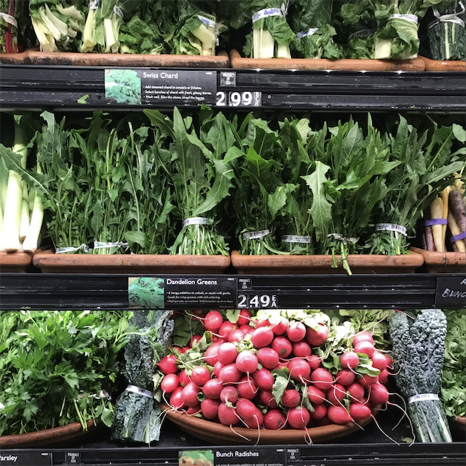
If someone were to ask me if they taste good, I’d have to respond with a qualified answer: Dandelions happen to be pretty delicious. In fact, their taste often resembles that of a slightly bitter arugula. So if you like a more bitter green, then yes, they’re delicious. But here’s the thing: Their health profile warrants using them—in salads especially. Just don’t overdo it, and pair not just the greens but diced stems with lots of romaine or bibb lettuce so their flavor is toned down.
This versatile “food” can also be fried, put into sauces, and so much more. And not to be redundant, but you really do want to start doing this because each little weed contains:
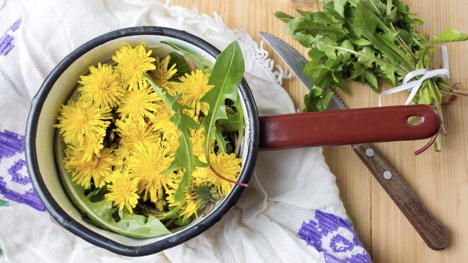
They’re toxin removers—one of the most effective there is for the blood, lymphatic system, and liver.
They’re loaded with antioxidants—helping to reduce the effects of aging and certain diseases.
They boost the immune system—because of their anti-viral and antimicrobial properties (which makes them excellent at fighting bacteria).
They protect the liver—meaning they help treat or prevent obesity-related nonalcoholic fatty liver disease.
They help treat anemia—due to their high iron content.
They help maintain blood sugar—thanks to their high concentration of chicoric and chlorogenic acid (bioactive compounds that help reduce blood sugar).
They help lower blood pressure—because of their superb potassium content.
They help with weight loss—due to their ability to improve carbohydrate metabolism and reduce fat absorption.
They support bone health—through the green leaves, which have high amounts of calcium and vitamin K which are both associated with healthy bones.
It looks like they help fight cancer (it’s still in the testing stage). At this time, dandelion root extract has been shown to dramatically slow the growth of cancer cells in the liver, colon, and pancreatic tissue when studied in test tubes.
The great thing about dandelions is you can’t mix them up with another weed. There really isn’t any other plant or herb that even closely resembles them.
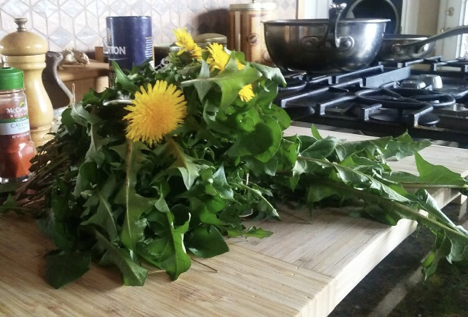
Finally, I’ll close with three cautions and my wish for happy hunting!
DO NOT harvest any dandelions that are close to a road. They can pick up pollution from cars.
NEVER harvest any dandelions from an industrial lot or any space where past pollution might have been an issue.
DO NOT harvest dandelions from a yard where chemicals like pesticides and fertilizers have been used.

And the answer is a resounding “YES!” We know them as weeds, and no one really considers them garden vegetables. Yet what a gift they are. Not only are they healthy for you, they are plentiful as well (as we know all too well around this time of year). Since they are weeds, they grow even if you don’t have a green thumb.
Moreover, not only are the leaves (the typical “dandelion greens” found in health food stores) edible, but you can actually eat all the other parts of the dandelion including the flowers, stems, and roots.

If someone were to ask me if they taste good, I’d have to respond with a qualified answer: Dandelions happen to be pretty delicious. In fact, their taste often resembles that of a slightly bitter arugula. So if you like a more bitter green, then yes, they’re delicious. But here’s the thing: Their health profile warrants using them—in salads especially. Just don’t overdo it, and pair not just the greens but diced stems with lots of romaine or bibb lettuce so their flavor is toned down.
This versatile “food” can also be fried, put into sauces, and so much more. And not to be redundant, but you really do want to start doing this because each little weed contains:
- Amino acids, fatty acids, and other acids necessary for health.
- Minerals, which include iron, zinc, boron, calcium, and silicon.
- Vitamins A, B, C, K, and E.
- One-half cup of dandelions contains more calcium than if you drank a glass of milk and more iron than you find in a serving of spinach.
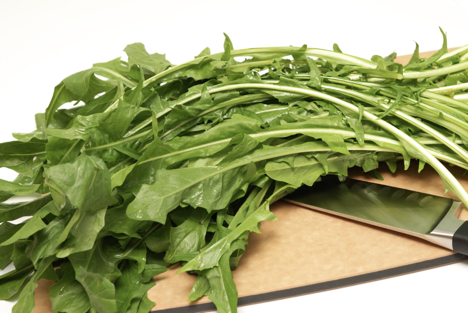

They’re toxin removers—one of the most effective there is for the blood, lymphatic system, and liver.
They’re loaded with antioxidants—helping to reduce the effects of aging and certain diseases.
They boost the immune system—because of their anti-viral and antimicrobial properties (which makes them excellent at fighting bacteria).
They protect the liver—meaning they help treat or prevent obesity-related nonalcoholic fatty liver disease.
They help treat anemia—due to their high iron content.
They help maintain blood sugar—thanks to their high concentration of chicoric and chlorogenic acid (bioactive compounds that help reduce blood sugar).
They help lower blood pressure—because of their superb potassium content.
They help with weight loss—due to their ability to improve carbohydrate metabolism and reduce fat absorption.
They support bone health—through the green leaves, which have high amounts of calcium and vitamin K which are both associated with healthy bones.
It looks like they help fight cancer (it’s still in the testing stage). At this time, dandelion root extract has been shown to dramatically slow the growth of cancer cells in the liver, colon, and pancreatic tissue when studied in test tubes.
The great thing about dandelions is you can’t mix them up with another weed. There really isn’t any other plant or herb that even closely resembles them.

Finally, I’ll close with three cautions and my wish for happy hunting!
DO NOT harvest any dandelions that are close to a road. They can pick up pollution from cars.
NEVER harvest any dandelions from an industrial lot or any space where past pollution might have been an issue.
DO NOT harvest dandelions from a yard where chemicals like pesticides and fertilizers have been used.
Sources:
- www.mymove.com
- www.specialtyproduce.com
- www.wholefoodsmarket.com
- www.thespruce.com
- www.familyfocusblog.com
 Alice Osborne
Alice Osborne
Weekly Newsletter Contributor since 2006
Email the author! alice@dvo.com
